

Research Proposal Ethics Statement Example
In the world of academic and professional research, ethical considerations are paramount. Whether you’re studying human behavior, testing new technologies, or analyzing historical data, your research must adhere to strict ethical standards. This is where an ethics statement comes into play. It’s a crucial component of any research proposal, demonstrating your commitment to conducting responsible, respectful, and rigorous research.
This comprehensive guide will walk you through the process of creating an ethics statement for your research proposal. We’ll explore each component in detail, provide examples, and offer insights to help you navigate potential ethical challenges.
By the end of this guide, you’ll have a clear understanding of how to craft an ethics statement that not only meets institutional requirements but also upholds the highest standards of ethical research.
What You'll Learn
What is an Ethics Statement?
An ethics statement, also known as an ethical considerations section or ethical framework, is a detailed document within your research proposal that outlines how you plan to address ethical issues throughout your study. It serves as a roadmap for conducting ethical research, demonstrating your awareness of potential ethical challenges and your strategies for managing them.
Key Purposes of an Ethics Statement:
- Participant Protection : It outlines measures to ensure the safety, privacy, and well-being of research participants.
- Ethical Compliance : It shows that your research adheres to established ethical guidelines and regulations.
- Transparency : It provides a clear overview of your research methods and potential impacts.
- Risk Management : It identifies potential ethical risks and outlines strategies to mitigate them.
- Quality Assurance : It helps maintain the integrity and credibility of your research.
Why is an Ethics Statement Important?
The importance of an ethics statement extends far beyond simply fulfilling a requirement. Let’s delve deeper into why this document is crucial for your research:
1. Protects Participants
The primary purpose of an ethics statement is to ensure the safety, rights, and well-being of your research participants. This includes:
- Physical safety: Minimizing any potential for harm or discomfort.
- Psychological well-being: Addressing potential emotional or mental stress.
- Privacy: Protecting personal information and maintaining confidentiality.
- Autonomy: Respecting participants’ right to make informed decisions about their involvement.
2. Builds Trust
An ethics statement demonstrates your commitment to ethical research practices, which helps to:
- Build credibility with participants, making them more likely to engage honestly.
- Establish trust with your institution, funding bodies, and the wider research community.
- Enhance the reputation of your research and your professional standing.
3. Meets Requirements
Many institutions and funding bodies require an ethics statement as part of the research proposal. It’s often a key factor in:
- Obtaining approval from ethics committees or institutional review boards.
- Securing funding for your research project.
- Getting permission to publish your findings in academic journals.
4. Improves Research Quality
Considering ethical implications often leads to better research design:
- It encourages you to think critically about your methodology.
- It helps identify potential biases or limitations in your approach.
- It can lead to more robust data collection and analysis procedures.
5. Promotes Responsible Science
An ethics statement contributes to the broader goal of promoting responsible scientific practices:
- It helps prevent misconduct and unethical behavior in research.
- It encourages transparency and reproducibility in scientific studies.
- It supports the overall integrity of the scientific process.
Key Components of an Ethics Statement
A comprehensive ethics statement typically includes the following components:
- Informed Consent
- Confidentiality and Privacy
- Risk Assessment and Management
- Data Storage and Protection
- Conflicts of Interest
- Vulnerable Populations (if applicable)
- Cultural Sensitivity
- Deception (if applicable)
- Ethical Approval Process
Let’s examine each of these components in detail, providing explanations, examples, and best practices for addressing them in your ethics statement.
1. Informed Consent
What it is:.
Informed consent is the process by which potential research participants are given all the information they need to make an educated decision about whether to participate in a study. It’s a fundamental ethical principle that respects individuals’ autonomy and right to self-determination.
Why it matters:
Informed consent ensures that participants understand what they’re agreeing to, including any potential risks or benefits. It protects participants from exploitation and helps maintain the integrity of the research process.
How to address it:
Explain in detail how you’ll obtain informed consent from participants. This typically involves:
- Providing an information sheet that clearly explains the study’s purpose, procedures, duration, potential risks and benefits, and participants’ rights.
- Using language that is easy to understand, avoiding jargon or complex terms.
- Allowing time for potential participants to ask questions and consider their decision.
- Obtaining written consent through a signed form or digital agreement for online studies.
- For ongoing studies, implementing a process for continuous consent, allowing participants to withdraw at any time.
“All potential participants will receive a comprehensive information sheet detailing the study’s objectives, methods, expected duration, and potential risks and benefits. This information will be presented in clear, jargon-free language and will be available in multiple languages to accommodate our diverse participant pool. Potential participants will have a minimum of 48 hours to review this information and ask any questions before being asked to sign a consent form. The consent form will clearly state that participation is voluntary and that they have the right to withdraw from the study at any time without penalty. For our online surveys, we will use a digital consent form that must be completed before accessing the survey questions. In the case of our longitudinal study component, we will implement a process of continuous consent, reconfirming participants’ willingness to continue at each stage of data collection.”
2. Confidentiality and Privacy
Confidentiality refers to the protection of participants’ personal information and the data they provide during the research. Privacy relates to participants’ right to control information about themselves and decide what information is shared and with whom.
Maintaining confidentiality and privacy is crucial for several reasons:
- It protects participants from potential harm or embarrassment that could result from their information being disclosed.
- It encourages honest and open responses, improving the quality of your data.
- It’s often a legal requirement, particularly when dealing with sensitive personal information.
Describe in detail the measures you’ll take to ensure confidentiality and protect participants’ privacy. This may include:
- Anonymization or pseudonymization of data
- Secure storage of identifying information
- Limited access to raw data
- Confidentiality agreements for research team members
- Plans for secure destruction of data after the retention period
“To ensure the highest level of confidentiality and privacy, we will implement a multi-layered approach:
- Data Anonymization: All collected data will be immediately anonymized. Each participant will be assigned a unique identifier, and any personally identifiable information will be removed from the dataset.
- Secure Data Storage: All research data will be stored on encrypted, password-protected servers. Physical documents will be kept in a locked cabinet in a secure office accessible only to authorized research team members.
- Limited Access: Only essential members of the research team will have access to the raw data. All team members will sign confidentiality agreements before being granted access.
- Separation of Identifying Information: Any documents linking participant identities to their unique identifiers will be stored separately from the research data, with access restricted to the principal investigator.
- Secure Data Transmission: When transferring data between researchers or institutions, we will use secure, encrypted file transfer protocols.
- Publication Safeguards: In all publications and presentations, we will ensure that no individual participant can be identified. We will use aggregate data and, where necessary, alter non-essential details to protect privacy.
- Data Retention and Destruction: We will retain the anonymized data for five years after the study’s completion, as required by our institution. After this period, electronic data will be securely erased using data destruction software, and physical documents will be shredded and disposed of securely.
- Participant Control: Participants will be informed of their right to request access to their personal data or to have it deleted at any time during the study.”
3. Risk Assessment and Management
Risk assessment involves identifying and evaluating potential risks to participants, researchers, or others involved in the study. Risk management is the process of developing strategies to minimize these risks.
Thorough risk assessment and management are crucial for:
- Protecting the physical and psychological well-being of participants and researchers
- Maintaining the ethical integrity of your research
- Complying with legal and institutional requirements
- Anticipating and preventing potential problems that could compromise your study
Provide a comprehensive overview of potential risks associated with your study and detailed plans for managing each risk. Consider:
- Physical risks
- Psychological risks
- Social risks
- Economic risks
- Legal risks
For each identified risk, explain:
- The nature and likelihood of the risk
- The potential impact if the risk occurs
- Strategies to prevent or minimize the risk
- Plans for addressing the risk if it does occur
“Our study on workplace stress involves both online surveys and in-person interviews. We have identified the following potential risks and developed corresponding management strategies:
- Risk: Participants may experience emotional distress when discussing stressful work experiences.
- Management: a) We will clearly warn participants about potentially distressing topics in the informed consent process. b) Participants will be reminded that they can skip questions or stop the interview at any time. c) We will provide contact information for free counseling services to all participants. d) Interviewers will be trained to recognize signs of distress and respond appropriately.
- Risk: Unauthorized access to sensitive personal and professional information.
- Management: a) Implementation of robust data security measures as outlined in our confidentiality section. b) Regular security audits of our data storage systems. c) Minimal collection of identifying information. d) Development of a data breach response plan, including prompt notification to affected participants.
- Risk: Participants may fear negative consequences at work if their responses become known to employers.
- Management: a) Strict confidentiality measures as detailed earlier. b) Clear communication to participants about how their data will be used and protected. c) Option for participants to review and approve any potentially identifying quotes before publication.
- Risk: Minimal risk of physical discomfort during lengthy interviews.
- Management: a) Interviews will be limited to 90 minutes with optional breaks. b) Interview locations will be chosen for comfort and accessibility. c) Participants will be encouraged to inform the interviewer if they need to pause or stop for any reason.
- Risk: Participation may be time-consuming, potentially causing stress or inconvenience.
- Management: a) Clear communication of expected time commitment in the informed consent process. b) Flexibility in scheduling interviews to accommodate participants’ preferences. c) Option to complete the survey in multiple sessions if needed.
In the unlikely event that any unanticipated risks emerge during the study, we will immediately halt data collection, assess the situation, and consult with our institutional ethics committee before proceeding.”
4. Data Storage and Protection
Data storage and protection refer to the methods and systems used to securely store, manage, and eventually dispose of research data. This includes both physical (e.g., paper documents) and digital data.
Proper data storage and protection are essential for:
- Maintaining participant confidentiality and privacy
- Ensuring the integrity and reliability of your research data
- Complying with data protection laws and regulations (e.g., GDPR in the EU)
- Preventing unauthorized access, data loss, or data breaches
Provide a detailed plan for how you will handle data throughout the research process. Include information on:
- Where and how data will be stored
- Who will have access to the data
- How long data will be retained
- How data will be securely destroyed after the retention period
- Measures to protect against data breaches or loss
“Our data storage and protection plan encompasses the entire data lifecycle, from collection to destruction:
- Online surveys will be conducted using Qualtrics, a GDPR-compliant platform with robust security features.
- Interview recordings will be made using encrypted digital recorders.
- All data transfers will occur over secure, encrypted connections.
- Physical transfer of data (e.g., from interview sites) will use encrypted portable devices.
- Digital data will be stored on a secure, access-controlled server maintained by our university’s IT department. This server is backed up daily and protected by enterprise-level firewalls.
- Any physical documents will be stored in a locked filing cabinet in a secure office accessible only to authorized research team members.
- Access to raw data will be limited to essential research team members, each of whom will have unique login credentials.
- A log will be maintained of all data access events.
- Data analysis will be conducted on secure, password-protected computers in a designated research area.
- When working remotely, researchers will use a secure VPN connection to access data.
- We will retain research data for five years after the completion of the study, as per our institution’s policy.
- During this time, data will be regularly reviewed to ensure it remains necessary for the purposes for which it is being retained.
- After the retention period, digital data will be securely erased using certified data destruction software that overwrites the data multiple times.
- Physical documents will be shredded using a cross-cut shredder and disposed of securely.
- In the event of a suspected data breach, we will immediately: a) Isolate affected systems to prevent further unauthorized access. b) Notify our institution’s data protection officer and IT security team. c) Conduct a thorough investigation to determine the extent of the breach. d) Notify affected participants and relevant authorities as required by law. e) Implement necessary measures to prevent similar breaches in the future.
- Our data protection measures will be reviewed and updated regularly to ensure they remain effective and comply with current best practices and regulations.”
5. Conflicts of Interest
A conflict of interest in research occurs when professional judgment concerning a primary interest (such as research validity) may be influenced by a secondary interest (such as financial gain or personal relationship).
Addressing conflicts of interest is crucial for:
- Maintaining the integrity and credibility of your research
- Ensuring unbiased data collection and analysis
- Complying with ethical guidelines and institutional policies
- Building trust with participants, peers, and the public
Provide a clear disclosure of any potential conflicts of interest related to your research. This should include:
- Financial interests (e.g., funding sources, personal investments)
- Personal relationships (e.g., familial ties to participants or stakeholders)
- Professional relationships (e.g., consulting work, board memberships)
- Intellectual property interests
For each potential conflict, explain how you plan to manage it to minimize its impact on your research.
“In the interest of full transparency, we disclose the following potential conflicts of interest and our plans to manage them:
- Potential Conflict: This study is partially funded by TechCorp, a major player in the industry we’re researching.
- Management Plan: a) The funding agreement explicitly states that TechCorp has no influence over the study design, data collection, analysis, or publication of results. b) We will clearly acknowledge TechCorp’s funding in all publications and presentations. c) All raw data and analysis procedures will be made available for independent verification.
- Potential Conflict: The lead researcher’s spouse is an employee of one of the companies included in our study.
- Management Plan: a) The lead researcher will not be involved in data collection or initial analysis for this specific company. b) An independent researcher will be brought in to oversee the data collection and analysis for this company. c) This relationship will be disclosed in all publications resulting from this research.
- Potential Conflict: One of our co-investigators has previously done consulting work for several companies in the industry we’re studying.
- Management Plan: a) The co-investigator will not be involved in data collection from any companies they’ve consulted for in the past five years. b) We will maintain a log of which team members are involved in data collection and analysis for each company to ensure no conflicts. c) This past consulting work will be disclosed in our methodology section and any resulting publications.
- Potential Conflict: Our research may lead to patentable innovations in workplace stress management tools.
- Management Plan: a) We have established a clear agreement with our institution regarding the ownership and potential commercialization of any intellectual property resulting from this research. b) Any patents filed as a result of this research will be disclosed this in future related academic work.
- Potential Conflict: The principal investigator has publicly expressed strong views on workplace stress management policies.
- Management Plan: a) We will implement a structured, objective data collection and analysis protocol to minimize potential bias. b) An independent researcher will review our analysis and conclusions to ensure objectivity. c) We will explicitly address how we’ve managed this potential bias in our methodology section.
We are committed to managing these conflicts of interest transparently and ethically. We will promptly disclose any additional conflicts that may arise during the course of the research and develop appropriate management strategies in consultation with our institutional ethics committee.”
6. Vulnerable Populations (if applicable)
Vulnerable populations are groups that require special ethical considerations due to their increased susceptibility to harm or exploitation in research contexts. These may include children, elderly individuals, prisoners, individuals with cognitive impairments, or socially or economically disadvantaged groups.
Extra care must be taken when working with vulnerable populations to:
- Protect their rights and well-being
- Ensure they are not exploited or unfairly burdened by research
- Address unique ethical challenges that may arise
- Comply with specific regulations governing research with these groups
If your research involves vulnerable populations, provide a detailed explanation of:
- Why the inclusion of this population is necessary for your research
- The specific vulnerabilities of this group in the context of your study
- Extra precautions you’ll take to protect their rights and well-being
- How you’ll obtain informed consent (including from guardians if applicable)
- Any special accommodations you’ll make in your research procedures
“Our study on the effects of social media use on mental health includes adolescents aged 13-17, who are considered a vulnerable population. We address this as follows:
- Justification for Inclusion: Adolescents are primary users of social media, and understanding its impact on their mental health is crucial for developing appropriate interventions and policies.
- Limited capacity to assess long-term risks and benefits
- Susceptibility to peer influence
- Ongoing cognitive and emotional development
- Potential for parental influence on participation decision
- We will obtain written consent from a parent or legal guardian for all participants under 18.
- We will also obtain assent from the adolescents themselves, using an age-appropriate assent form.
- Both parents and adolescents will be informed that the adolescent can withdraw at any time, regardless of parental consent.
- All study materials, including information sheets and survey questions, will be written in clear, simple language appropriate for the youngest participants.
- We will pilot test these materials with a small group of adolescents to ensure comprehension.
- Extra measures will be taken to protect adolescents’ privacy, including conducting online surveys that can be completed privately.
- We will clearly explain to both parents and adolescents what information will and will not be shared with parents.
- Our study is designed to pose no more than minimal risk to participants.
- Questions about sensitive topics (e.g., cyberbullying) will be carefully worded and optional.
- We will provide all participants with information about mental health resources, including helplines and online support specifically for adolescents.
- All researchers interacting with adolescent participants will undergo specialized training in working with this age group.
- We will establish a process for ongoing monitoring of participant well-being throughout the study.
- We will clearly explain our legal obligations to report any disclosures of abuse or serious self-harm, both in the consent/assent process and at the beginning of data collection.
By implementing these measures, we aim to conduct our research ethically and responsibly while gathering valuable data on this important topic.”
7. Cultural Sensitivity
Cultural sensitivity in research involves recognizing, respecting, and appropriately responding to the diversity of cultural backgrounds, beliefs, and practices among your research participants.
Cultural sensitivity is crucial for:
- Ensuring equitable treatment of all participants
- Avoiding misunderstandings or offense that could compromise your research
- Collecting more accurate and meaningful data
- Building trust with diverse communities
- Producing research results that are applicable across different cultural contexts
Explain how you’ll ensure cultural sensitivity throughout your research process. Consider:
- Language and communication
- Customs and traditions
- Religious beliefs and practices
- Gender roles and norms
- Socioeconomic factors
“Our research on global workplace practices involves participants from diverse cultural backgrounds. We will ensure cultural sensitivity through the following measures:
- All research materials (information sheets, consent forms, surveys, interview scripts) will be professionally translated into the primary languages of our participant groups.
- Bilingual researchers or interpreters will be available for interviews and focus groups.
- We will consult with cultural experts or community leaders from each major cultural group represented in our study to review our research materials and protocols.
- These consultations will help us identify and address potential cultural sensitivities or misunderstandings.
- Our research team includes members from various cultural backgrounds, providing diverse perspectives in study design and data interpretation.
- Team members will undergo cultural competency training specific to the cultures represented in our study.
- We will accommodate different cultural and religious observances when scheduling interviews and focus groups.
- Participants will be asked about any timing considerations during the recruitment process.
- In cultures where it may be inappropriate for men to interview women (or vice versa), we will match the gender of interviewers and participants as needed.
- We will be mindful of gender dynamics in mixed-gender focus groups and adjust our facilitation accordingly.
- We will consult with local contacts to ensure that any incentives or compensation offered are culturally appropriate and do not inadvertently cause offense or undue influence.
- In cultures where it’s important to obtain approval from community leaders or elders before conducting research, we will follow appropriate protocols to seek this approval.
- We will be mindful of culturally sensitive topics and approach them carefully in our questions.
- Participants will always have the option to decline answering any questions they’re uncomfortable with.
- We will be cautious about imposing Western frameworks on data interpretation and will consider cultural contexts in our analysis.
- Where appropriate, we will involve participants or cultural consultants in reviewing our interpretations.
- We will make efforts to disseminate our research findings in culturally appropriate ways, including providing summaries in local languages.
- We will be mindful of any cultural sensitivities in how we present our findings.
By implementing these measures, we aim to conduct our research in a way that respects and values the cultural diversity of our participants, leading to more valid and ethically sound results.”
8. Deception (if applicable)
Deception in research involves deliberately withholding information from or misleading participants about the true nature or purpose of a study.
While sometimes necessary for certain types of research (e.g., some psychology studies), deception raises significant ethical concerns:
- It can violate the principle of informed consent
- It may cause distress to participants when the deception is revealed
- It can potentially damage trust in researchers and the scientific process
If your research involves any form of deception, you must:
- Provide a strong justification for why deception is necessary
- Explain why alternative methods without deception are not feasible
- Describe the nature and extent of the deception
- Detail how and when participants will be debriefed
- Explain how you’ll mitigate potential negative effects of the deception
“Our study on decision-making under pressure involves a minor element of deception. We address this as follows:
- Justification for Deception: The study aims to measure natural responses to unexpected time pressure. If participants know in advance that they will face sudden time constraints, it would likely alter their behavior and invalidate our results.
- Nature of Deception: Participants will be told they have 30 minutes to complete a series of decision-making tasks. However, at a random point between 10-15 minutes into the session, they will be informed that due to a “scheduling error,” they must complete the tasks in the next 5 minutes.
- Alternatives Considered: We considered informing participants that time pressure might be introduced but concluded this would still likely alter their approach to the tasks. We also considered using naturally occurring time pressure situations but found we couldn’t control for important variables in such settings.
- The deception is minor and short-lived.
- No false information is given about the nature of the tasks themselves.
- The time pressure, while unexpected, is not extreme and poses minimal risk of distress.
- Immediately after completing the tasks, participants will be fully debriefed about the deception.
- We will explain the true purpose of the study and the reason for the deception.
- Participants will have the opportunity to ask questions and discuss their experience.
- We will assess whether the deception caused any distress and provide appropriate support if needed.
- During the debriefing, participants will be given the option to withdraw their data if they are uncomfortable with the deception used.
- This will be a genuine option with no penalty, and we will make it clear that withdrawing will not affect any compensation they were promised.
- This use of deception has been reviewed and approved by our institutional ethics committee.
- We will report any unanticipated negative reactions to the committee and adjust our protocols if necessary.
By carefully limiting and managing this minor deception, we aim to balance the scientific need for valid data with our ethical obligation to treat participants with respect and minimize potential harm.”
9. Debriefing
Debriefing is the process of providing participants with full information about the study after their participation is complete. It’s particularly important in studies involving deception but is valuable in all types of research.
Debriefing serves several important purposes:
- It fulfills the ethical obligation to inform participants about the true nature of the research they participated in
- It provides an opportunity to assess and mitigate any negative effects of participation
- It can be an educational opportunity for participants to learn about the research process
- It allows researchers to gather valuable feedback from participants
Explain your debriefing process, including:
- When and how debriefing will occur
- What information will be provided during debriefing
- How you’ll address any questions or concerns raised by participants
- What support will be available if participants experience any distress
“Our debriefing process is designed to ensure that all participants leave the study fully informed and with a positive research experience:
- Debriefing will occur immediately after the completion of each participant’s involvement in the study.
- For in-person studies, this will be a face-to-face conversation. For online studies, we will provide a detailed written debriefing followed by the option for a phone or video call with a researcher.
- We will explain the full purpose of the study, including any elements that were not disclosed at the outset.
- We’ll describe how the data will be used and what we hope to learn from the study.
- If any deception was used, we’ll explain why it was necessary and give participants the option to withdraw their data.
- We’ll invite participants to share their experience of the study and any thoughts or feelings it brought up.
- This feedback will be recorded (with permission) to help us improve our research processes.
- Participants will be encouraged to ask any questions they have about the study.
- We’ll provide honest, clear answers and take the time to ensure participants fully understand.
- We’ll ask participants if they experienced any discomfort or distress during the study.
- If any negative impacts are identified, we’ll discuss these with the participant and offer appropriate support.
- All participants will receive a handout with contact information for the research team and relevant support services.
- For studies dealing with sensitive topics, we’ll have a trained counselor available during debriefing sessions.
- Participants will be given the option to receive a summary of the study results when available.
- We’ll provide our contact information and encourage participants to reach out if they have any questions or concerns in the future.
- We’ll remind participants about our confidentiality procedures and how their data will be protected.
- We’ll express our sincere thanks for their participation and explain how their contribution helps advance knowledge in the field.
By conducting thorough, thoughtful debriefings, we aim to ensure that participation in our research is a positive, educational experience and that participants feel respected and valued for their contribution.”
10. Ethical Approval Process
The ethical approval process involves submitting your research proposal, including your ethics statement, to an Institutional Review Board (IRB) or Ethics Committee for review and approval before beginning your research.
Obtaining ethical approval is crucial because it:
- Ensures your research meets established ethical standards
- Protects the rights and well-being of your participants
- Helps identify and address potential ethical issues before they arise
- Is often required for publication and funding
- Provides legal and institutional protection for researchers
Outline the steps you’ll take to obtain ethical approval, including:
- Which ethics committee or IRB you’ll submit to
- What documents you’ll include in your submission
- Your timeline for obtaining approval
- How you’ll address any feedback or concerns from the committee
- Your plan for ongoing ethical oversight throughout the research process
Related Articles
How to Critically Appraise a Research Article
How to Write a Psychology Research Proposal
Addressing ethical issues in your research proposal
“We are committed to conducting our research in full compliance with ethical standards. Our ethical approval process will proceed as follows:
- Detailed research proposal
- This ethics statement
- All research instruments (surveys, interview guides, etc.)
- Informed consent forms
- Recruitment materials
- Data management plan
- CVs of key research personnel
- Before submission, our application will be reviewed by senior colleagues in our department to identify any potential issues.
- We will submit our application to the University of [Name] Institutional Review Board (IRB).
- Submission will occur at least two months before our planned start date to allow time for review and any necessary revisions.
- We will promptly address any questions or concerns raised by the IRB.
- If major changes are required, we will consult with our research team and advisors to ensure we maintain the integrity of our study while meeting ethical requirements.
- We will not begin any recruitment or data collection until we have received written approval from the IRB.
- Once approved, we will keep a copy of the approval letter on file and available for review if needed.
- We will adhere strictly to the approved protocol throughout the study.
- Any proposed changes to the research design or procedures will be submitted to the IRB for review and approval before implementation.
- We will promptly report any unanticipated problems or adverse events to the IRB.
- For studies lasting more than one year, we will submit an annual progress report to the IRB for continuing review and approval.
- Upon completion of the study, we will submit a final report to the IRB, including a summary of results and any ethical issues encountered.
- We will include a statement about ethical approval in all publications and presentations resulting from this research.
By following this rigorous ethical approval process, we aim to ensure that our research meets the highest ethical standards and respects the rights and well-being of all participants.”
Start by filling this short order form order.studyinghq.com
And then follow the progressive flow.
Having an issue, chat with us here
Cathy, CS.
New Concept ? Let a subject expert write your paper for You
Post navigation
Previous post.
📕 Studying HQ
Typically replies within minutes
Hey! 👋 Need help with an assignment?
🟢 Online | Privacy policy
WhatsApp us

Ethics statement examples - ESRC
Introduction.
Proposals submitted to the ESRC must provide a full ethics statement that confirms that proper consideration has been given to any ethics issues raised. All ESRC-funded grants must be approved by at least a light-touch ethics review.
The ESRC does not require a favourable ethics opinion to be secured prior to submission of a research proposal. However, a proposal must state what the applicant considers to be the possible ethics implications throughout the research project lifecycle, what measures will be taken for ongoing consideration of ethics issues, what review will be required for their proposed research and how and when it will be obtained.
Risk and benefit to researchers, participants and others (for example, potentially stigmatised or marginalised groups) as a result of the research and the potential impact, knowledge exchange, dissemination activity and future re-use of the data should also be considered as part of the ethical statement.
If an ethics review is required at a later stage in the project, this should be discussed and funding arrangements agreed in advance with the ESRC. At a minimum we expect that ethics review will be undertaken prior to the stage in the project that the actual research is carried out.
During peer review, reviewers and assessors will be asked to consider the ethical statement in the proposal. If they disagree with the proposed approach to ethics issues, or the statement does not adequately address these issues, this could lead to the rejection of a proposal, or the award of a conditional grant to ensure the necessary ethical considerations and ethical review are undertaken.
Last updated: 28 January 2022
This is the website for UKRI: our seven research councils, Research England and Innovate UK. Let us know if you have feedback or would like to help improve our online products and services .
- The Open University
- Accessibility hub
- Guest user / Sign out
- Study with The Open University
My OpenLearn Profile
Personalise your OpenLearn profile, save your favourite content and get recognition for your learning

Addressing ethical issues in your research proposal
This article explores the ethical issues that may arise in your proposed study during your doctoral research degree.
What ethical principles apply when planning and conducting research?
Research ethics are the moral principles that govern how researchers conduct their studies (Wellcome Trust, 2014). As there are elements of uncertainty and risk involved in any study, every researcher has to consider how they can uphold these ethical principles and conduct the research in a way that protects the interests and welfare of participants and other stakeholders (such as organisations).
You will need to consider the ethical issues that might arise in your proposed study. Consideration of the fundamental ethical principles that underpin all research will help you to identify the key issues and how these could be addressed. As you are probably a practitioner who wants to undertake research within your workplace, consider how your role as an ‘insider’ influences how you will conduct your study. Think about the ethical issues that might arise when you become an insider researcher (for example, relating to trust, confidentiality and anonymity).
What key ethical principles do you think will be important when planning or conducting your research, particularly as an insider? Principles that come to mind might include autonomy, respect, dignity, privacy, informed consent and confidentiality. You may also have identified principles such as competence, integrity, wellbeing, justice and non-discrimination.
Key ethical issues that you will address as an insider researcher include:
- Gaining trust
- Avoiding coercion when recruiting colleagues or other participants (such as students or service users)
- Practical challenges relating to ensuring the confidentiality and anonymity of organisations and staff or other participants.
(Heslop et al, 2018)
A fuller discussion of ethical principles is available from the British Psychological Society’s Code of Human Research Ethics (BPS, 2021).
You can also refer to guidance from the British Educational Research Association and the British Association for Applied Linguistics .

Ethical principles are essential for protecting the interests of research participants, including maximising the benefits and minimising any risks associated with taking part in a study. These principles describe ethical conduct which reflects the integrity of the researcher, promotes the wellbeing of participants and ensures high-quality research is conducted (Health Research Authority, 2022).
Research ethics is therefore not simply about gaining ethical approval for your study to be conducted. Research ethics relates to your moral conduct as a doctoral researcher and will apply throughout your study from design to dissemination (British Psychological Society, 2021). When you apply to undertake a doctorate, you will need to clearly indicate in your proposal that you understand these ethical principles and are committed to upholding them.
Where can I find ethical guidance and resources?
Professional bodies, learned societies, health and social care authorities, academic publications, Research Ethics Committees and research organisations provide a range of ethical guidance and resources. International codes such as the Universal Declaration of Human Rights underpin ethical frameworks (United Nations, 1948).
You may be aware of key legislation in your own country or the country where you plan to undertake the research, including laws relating to consent, data protection and decision-making capacity, for example, the Data Protection Act, 2018 (UK). If you want to find out more about becoming an ethical researcher, check out this Open University short course: Becoming an ethical researcher: Introduction and guidance: What is a badged course? - OpenLearn - Open University
You should be able to justify the research decisions you make. Utilising these resources will guide your ethical judgements when writing your proposal and ultimately when designing and conducting your research study. The Ethical Guidelines for Educational Research (British Educational Research Association, 2018) identifies the key responsibilities you will have when you conduct your research, including the range of stakeholders that you will have responsibilities to, as follows:
- to your participants (e.g. to appropriately inform them, facilitate their participation and support them)
- clients, stakeholders and sponsors
- the community of educational or health and social care researchers
- for publication and dissemination
- your wellbeing and development
The National Institute for Health and Care Research (no date) has emphasised the need to promote equality, diversity and inclusion when undertaking research, particularly to address long-standing social and health inequalities. Research should be informed by the diversity of people’s experiences and insights, so that it will lead to the development of practice that addresses genuine need. A commitment to equality, diversity and inclusion aims to eradicate prejudice and discrimination on the basis of an individual or group of individuals' protected characteristics such as sex (gender), disability, race, sexual orientation, in line with the Equality Act 2010.
The NIHR has produced guidance for enhancing the inclusion of ‘under-served groups’ when designing a research study (2020). Although the guidance refers to clinical research it is relevant to research more broadly.
You should consider how you will promote equality and diversity in your planned study, including through aspects such as your research topic or question, the methodology you will use, the participants you plan to recruit and how you will analyse and interpret your data.
What ethical issues do I need to consider when writing my research proposal?
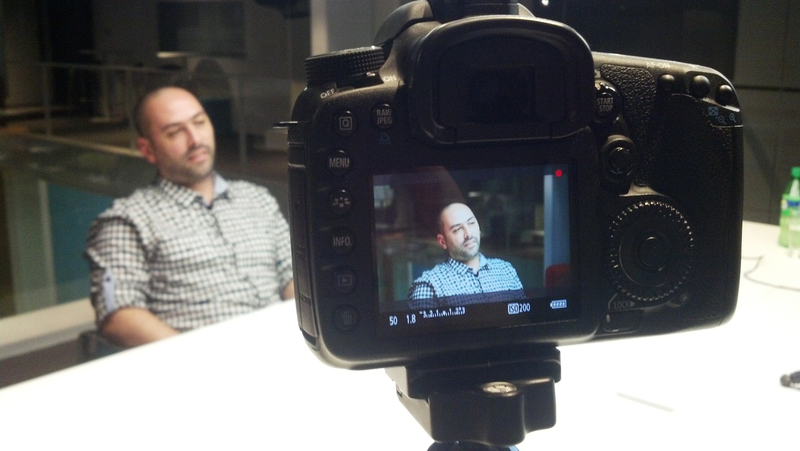
You might be planning to undertake research in a health, social care, educational or other setting, including observations and interviews. The following prompts should help you to identify key ethical issues that you need to bear in mind when undertaking research in such settings.
1. Imagine you are a potential participant. Think about the questions and concerns that you might have:
- How would you feel if a researcher sat in your space and took notes, completed a checklist, or made an audio or film recording?
- What harm might a researcher cause by observing or interviewing you and others?
- What would you want to know about the researcher and ask them about the study before giving consent?
- When imagining you are the participant, how could the researcher make you feel more comfortable to be observed or interviewed?
2. Having considered the perspective of your potential participant, how would you take account of concerns such as privacy, consent, wellbeing and power in your research proposal?
[Adapted from OpenLearn course: Becoming an ethical researcher, Week 2 Activity 3: Becoming an ethical researcher - OpenLearn - Open University ]
The ethical issues to be considered will vary depending on your organisational context/role, the types of participants you plan to recruit (for example, children, adults with mental health problems), the research methods you will use, and the types of data you will collect. You will need to decide how to recruit your participants so you do not inappropriately exclude anyone. Consider what methods may be necessary to facilitate their voice and how you can obtain their consent to taking part or ensure that consent is obtained from someone else as necessary, for example, a parent in the case of a child.
You should also think about how to avoid imposing an unnecessary burden or costs on your participants. For example, by minimising the length of time they will have to commit to the study and by providing travel or other expenses. Identify the measures that you will take to store your participants’ data safely and maintain their confidentiality and anonymity when you report your findings. You could do this by storing interview and video recordings in a secure server and anonymising their names and those of their organisations using pseudonyms.
Professional codes such as the Code of Human Research Ethics (BPS, 2021) provide guidance on undertaking research with children. Being an ‘insider’ researching within your own organisation has advantages. However, you should also consider how this might impact on your research, such as power dynamics, consent, potential bias and any conflict of interest between your professional and researcher roles (Sapiro and Matthews, 2020).
How have other researchers addressed any ethical challenges?
The literature provides researchers’ accounts explaining how they addressed ethical challenges when undertaking studies. For example, Turcotte-Tremblay and McSween-Cadieux (2018) discuss strategies for protecting participants’ confidentiality when disseminating findings locally, such as undertaking fieldwork in multiple sites and providing findings in a generalised form. In addition, professional guidance includes case studies illustrating how ethical issues can be addressed, including when researching online forums (British Sociological Association, no date).
Watch the videos below and consider what insights the postgraduate researcher and supervisor provide regarding issues such as being an ‘insider researcher’, power relations, avoiding intrusion, maintaining participant anonymity and complying with research ethics and professional standards. How might their experiences inform the design and conduct of your own study?
Postgraduate researcher and supervisor talk about ethical considerations
Your thoughtful consideration of the ethical issues that might arise and how you would address these should enable you to propose an ethically informed study and conduct it in a responsible, fair and sensitive manner.
British Educational Research Association (2018) Ethical Guidelines for Educational Research. Available at: https://www.bera.ac.uk/publication/ethical-guidelines-for-educational-research-2018 (Accessed: 9 June 2023).
British Psychological Society (2021) Code of Human Research Ethics . Available at: https://cms.bps.org.uk/sites/default/files/2022-06/BPS%20Code%20of%20Human%20Research%20Ethics%20%281%29.pdf (Accessed: 9 June 2023).
British Sociological Association (2016) Researching online forums . Available at: https://www.britsoc.co.uk/media/24834/j000208_researching_online_forums_-cs1-_v3.pdf (Accessed: 9 June 2023).
Health Research Authority (2022) UK Policy Framework for Health and Social Care Research . Available at: https://www.hra.nhs.uk/planning-and-improving-research/policies-standards-legislation/uk-policy-framework-health-social-care-research/uk-policy-framework-health-and-social-care-research/#chiefinvestigators (Accessed: 9 June 2023).
Heslop, C., Burns, S., Lobo, R. (2018) ‘Managing qualitative research as insider-research in small rural communities’, Rural and Remote Health , 18: pp. 4576.
Equality Act 2010, c. 15. Available at: https://www.legislation.gov.uk/ukpga/2010/15/introduction (Accessed: 9 June 2023).
National Institute for Health and Care Research (no date) Equality, Diversity and Inclusion (EDI) . Available at: https://arc-kss.nihr.ac.uk/public-and-community-involvement/pcie-guide/how-to-do-pcie/equality-diversity-and-inclusion-edi (Accessed: 9 June 2023).
National Institute for Health and Care Research (2020) Improving inclusion of under-served groups in clinical research: Guidance from INCLUDE project. Available at: https://www.nihr.ac.uk/documents/improving-inclusion-of-under-served-groups-in-clinical-research-guidance-from-include-project/25435 (Accessed: 9 June 2023).
Sapiro, B. and Matthews, E. (2020) ‘Both Insider and Outsider. On Conducting Social Work Research in Mental Health Settings’, Advances in Social Work , 20(3). Available at: https://doi.org/10.18060/23926
Turcotte-Tremblay, A. and McSween-Cadieux, E. (2018) ‘A reflection on the challenge of protecting confidentiality of participants when disseminating research results locally’, BMC Medical Ethics, 19(supplement 1), no. 45. Available at: https://bmcmedethics.biomedcentral.com/articles/10.1186/s12910-018-0279-0
United Nations General Assembly (1948) The Universal Declaration of Human Rights . Resolution A/RES/217/A. Available at: https://www.un.org/en/about-us/universal-declaration-of-human-rights#:~:text=Drafted%20by%20representatives%20with%20different,all%20peoples%20and%20all%20nations . (Accessed: 9 June 2023).
Wellcome Trust (2014) Ensuring your research is ethical: A guide for Extended Project Qualification students . Available at: https://wellcome.org/sites/default/files/wtp057673_0.pdf (Accessed: 9 June 2023).
More articles from the research proposal collection

Writing your research proposal
A doctoral research degree is the highest academic qualification that a student can achieve. The guidance provided in these articles will help you apply for one of the two main types of research degree offered by The Open University.
Level: 1 Introductory

Defining your research methodology
Your research methodology is the approach you will take to guide your research process and explain why you use particular methods. This article explains more.

Writing your proposal and preparing for your interview
The final article looks at writing your research proposal - from the introduction through to citations and referencing - as well as preparing for your interview.
Free courses on postgraduate study

Are you ready for postgraduate study?
This free course, Are you ready for postgraduate study, will help you to become familiar with the requirements and demands of postgraduate study and ensure you are ready to develop the skills and confidence to pursue your learning further.

Succeeding in postgraduate study
This free course, Succeeding in postgraduate study, will help you to become familiar with the requirements and demands of postgraduate study and to develop the skills and confidence to pursue your learning further.

Applying to study for a PhD in psychology
This free OpenLearn course is for psychology students and graduates who are interested in PhD study at some future point. Even if you have met PhD students and heard about their projects, it is likely that you have only a vague idea of what PhD study entails. This course is intended to give you more information.
Become an OU student
Ratings & comments, share this free course, copyright information, publication details.
- Originally published: Tuesday, 27 June 2023
- Body text - Creative Commons BY-NC-SA 4.0 : The Open University
- Image 'Pebbles balance on a stone see-saw' - Copyright: Photo 51106733 / Balance © Anatoli Styf | Dreamstime.com
- Image 'Camera equipment set up filming a man talking' - Copyright: Photo 42631221 © Gabriel Robledo | Dreamstime.com
- Image 'Succeeding in postgraduate study' - Copyright: © Everste/Getty Images
- Image 'Are you ready for postgraduate study?' - Copyright free
- Image 'Applying to study for a PhD in psychology' - Copyright free
- Image 'Writing your research proposal' - Copyright free
- Image 'Defining your research methodology' - Copyright free
- Image 'Addressing ethical issues in your research proposal' - Copyright: Photo 50384175 / Children Playing © Lenutaidi | Dreamstime.com
- Image 'Writing your proposal and preparing for your interview' - Copyright: Photo 133038259 / Black Student © Fizkes | Dreamstime.com
Rate and Review
Rate this article, review this article.
Log into OpenLearn to leave reviews and join in the conversation.
Article reviews
For further information, take a look at our frequently asked questions which may give you the support you need.
Share this article

Research Ethics
Ai generator.

According to the article posted in TheScientist, Paolo Machiarini, a trachea surgeon, was one of the researchers that the authorities reported committing research misconduct. The site reported that while at the Karolinksa Institute, the said researcher conducted transplant experiments that resulted in the death of some participants. This controversial biomedical research ethical issue pushes the authorities of Sweden to implement a law about research misconduct . This law allows the government to create an agency that will investigate clinical researches , among other types of studies, for possible research misconduct.
What is Research Ethics?
Ethics, in general, is a philosophy that deals with what is right and wrong. This thinking applies to research projects because it ensures that researchers are maintaining a high ethical measure in all affecting factors. When conducting studies, such as qualitative research in medicine, you should consider factors such as the way you are treating animal and human subjects. Through this philosophy, individuals, such as qualitative research ethics committees can create guidelines that teach to avoid research misconduct, such as the incident that we mentioned earlier.
What is Bioethics?
Among the studies that experts conduct, biological and medical examinations are a few of the most delicate ones because it may involve animals and human value. However, to maintain high ethical standards, experts address its ethical implications and application through the field of bioethics. This field tackles the extensive inquiries that concern human affairs in which coverage includes the arguments of boundaries life, such as abortion and euthanasia, and the limited health care support allocation.

10+ Research Ethics Examples
Below is a list of examples that we collected, which you can use to study further about research ethics. You can download these documents in PDF format.
1. Research Ethics and Integrity Example
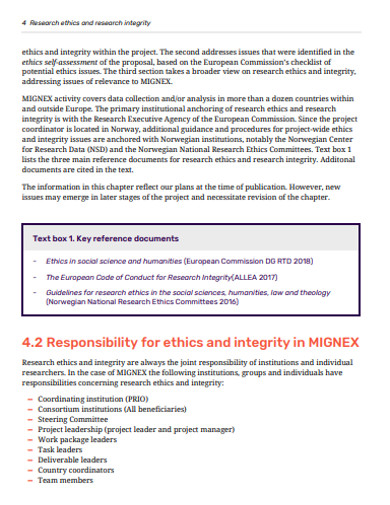
Size: 326 KB
2. Research Ethics Code and Procedures Example
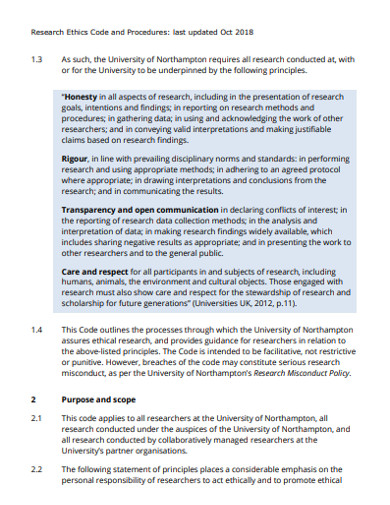
Size: 502 KB
3. Research Ethics Protocal Example
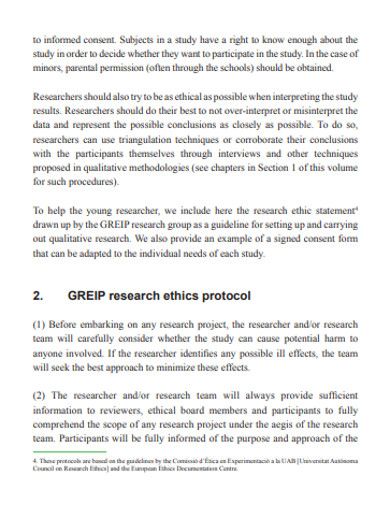
Size: 374 KB
4. Framework for Research Ethics Example
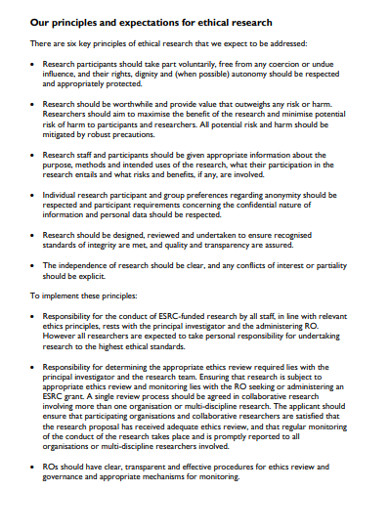
Size: 305 KB
5. Human Research Ethics Example
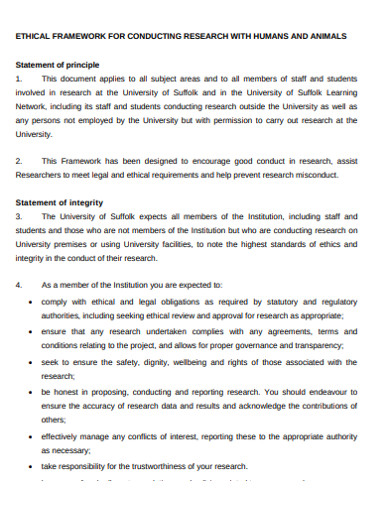
Size: 135 KB
6. Research Ethics Policy Example
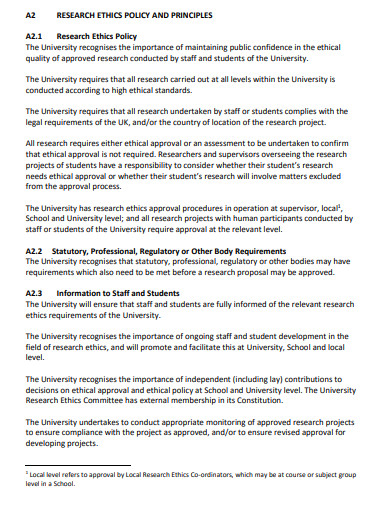
Size: 391 KB
7. Human Research Ethics Manual Example
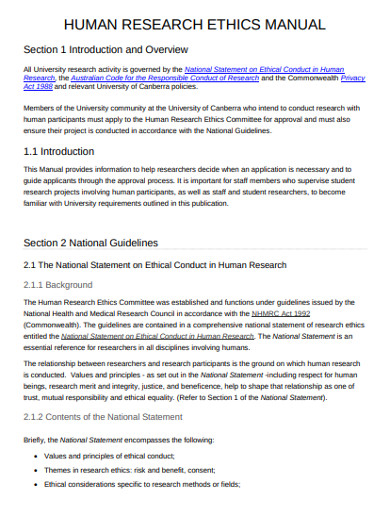
Size: 184 KB
8. Ethical for Scientific Research Example
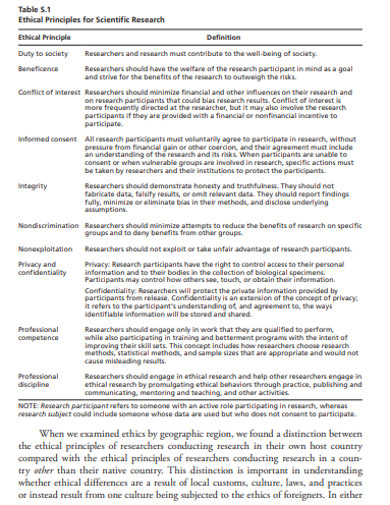
9. Sample List of Human Research Ethics Example
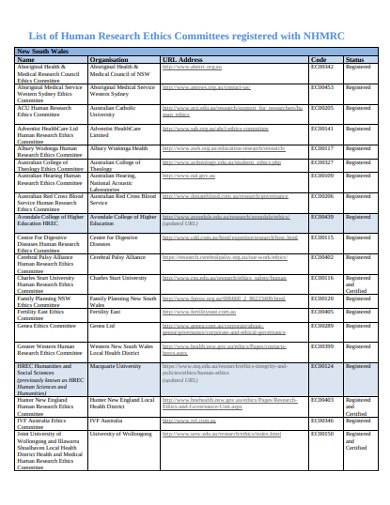
Size: 188 KB
10. Research Ethics Checklist Example
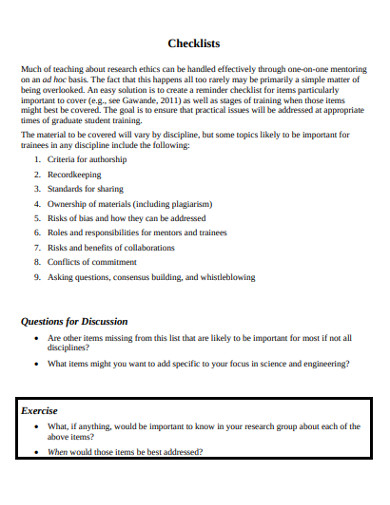
Size: 93 KB
11. Staff Research Ethics Example
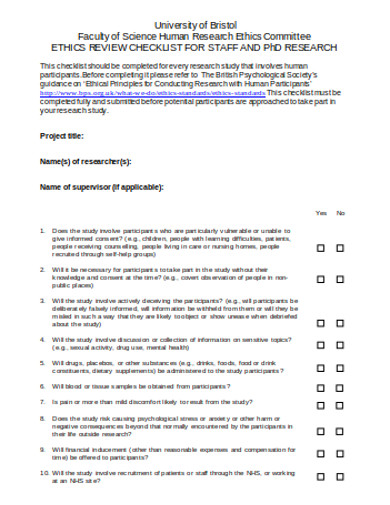
Size: 13 KB
How to Avoid Ethical Problems?
In carrying out an educational or academic study in psychology and other science sectors, there are critical things that you must keep in mind. It is to ensure that you are conducting the research responsibly, which we are going to discuss in this section.
1. Firstly, Talk about Intellectual Property
Scenarios such as disagreements in getting the credits can occur if conducting a research project involves a group of contributors. With this in mind, it is practical to discuss the matters concerning intellectual property before doing anything else. Individuals such as psychologists should take credits only when they have essential contributions to the project. Additionally, holding a prominent position in an organization does not guarantee acknowledgment to the project.
2. Observe the Confidentiality and Privacy
As a researcher, keep in mind that the information you need can be too personal and sensitive. Thus, it would help if you consider the survey questions that you are going to ask the participants. Since they have the right to choose the information that they want to give, it is essential to select your study’s participants carefully. Consider discussing the purpose of the data that you are going to gather and how you will collect this information. Know the valuable information, such as the laws involving your research and data sharing, especially if you are planning to gather the information through the internet.
3. Be Conscious of Multiple Roles
If you are a professor who conducts a study that requires the participation of specific individuals, such as students, you must not use your position to compel your students to participate unless it is part of the syllabus and has educative value for them. To ensure that people are not joining due to the influence of your power, they should participate in the study voluntarily.
4. Adhere to the Consent Rules
In conducting psychology research, as per APA’s Ethics Code, you must inform the participants about the necessary information, such as the relevant risks and benefits of participating in the study. The details they need to know may include the purpose of the research and its duration and process. They should also understand the factors that may affect their decisions to join, such as potential risks, discomfort, and the consequences of joining the activities involved. With this in mind, they should know that they have the right to refuse to participate and withdraw from their participation in the middle of the project process. Other things that they must be aware of are the confidentiality limits, including the instances where they can disclose the information, incentives of joining, and the contact details for their further inquiries.
5. Utilize the Ethics Resources
To ensure that you are adhering to the ethical standard in conducting research, it would help if you have mastered your moral obligation as a researcher, for it will allow you to know what to avoid and what do to fix its concerning problems. That’s why it is essential to know all the necessary resources that contain this information.
Conducting researches can be essential to study the nature of the things around us, for it helps us make our lives better. However, in doing this activity, you should be aware of the consequences that it brings, especially to the adverse effects of executing its process. Learning research ethics is one way to ensure that every research methodology that you are going to carry out is following the moral philosophy.
Text prompt
- Instructive
- Professional
10 Examples of Public speaking
20 Examples of Gas lighting
- Privacy Policy

Home » Ethical Considerations – Types, Examples and Writing Guide
Ethical Considerations – Types, Examples and Writing Guide
Table of Contents
Ethical considerations are essential in research and professional practice, ensuring that work is conducted with integrity, respect, and responsibility. Addressing ethical concerns involves identifying and mitigating potential risks to participants, society, and the integrity of research. This guide explores the types of ethical considerations, real-world examples, and provides a structured writing guide for addressing ethics in academic or professional settings.

Ethical Considerations
Ethical considerations are principles that guide the conduct of research or practice to ensure fairness, transparency, and respect for all parties involved. In research, they protect participants’ rights, maintain data integrity, and prevent harm. Ethical considerations often include informed consent, confidentiality, conflict of interest, and the minimization of risks.
Key Purposes of Ethical Considerations :
- Protect Participant Rights : Safeguard privacy, consent, and well-being.
- Maintain Research Integrity : Ensure accuracy, transparency, and honesty.
- Promote Social Responsibility : Avoid harm to individuals and communities.
Types of Ethical Considerations
1. informed consent.
Informed consent ensures that participants are fully aware of the research purpose, methods, potential risks, and benefits. Participants must voluntarily agree to participate without coercion or undue influence.
- Example : In a medical study, participants are given a document explaining the study’s purpose, procedures, and risks, and must sign it to confirm they understand and agree to participate.
2. Confidentiality and Privacy
Confidentiality involves protecting participants’ data and privacy, ensuring that their personal information is not disclosed without permission. Researchers are responsible for safeguarding data and maintaining anonymity.
- Example : A survey on mental health should not reveal any identifying information about participants, and data should be stored securely to protect privacy.
3. Minimization of Harm
Minimizing harm requires researchers to reduce any risks to participants. Harm can be physical, psychological, social, or emotional, and researchers must design studies that avoid unnecessary distress.
- Example : In an experiment involving stressful tasks, researchers should monitor participants’ stress levels and allow them to withdraw if discomfort arises.
4. Conflict of Interest
Conflict of interest occurs when researchers or practitioners have personal or financial interests that could affect their objectivity. Disclosing any potential conflicts is critical to maintaining transparency and credibility.
- Example : A pharmaceutical researcher with stock in a drug company must disclose this relationship to avoid bias when reporting drug effectiveness.
5. Honesty and Integrity
Honesty and integrity in research involve accurately reporting findings, avoiding fabrication or falsification of data, and acknowledging any limitations of the study. Plagiarism is also a violation of research integrity.
- Example : A researcher should report all data, even if results do not support their hypothesis, to ensure truthful representation of findings.
6. Respect for Vulnerable Populations
Researchers must take special care when working with vulnerable populations, such as children, elderly individuals, or people with disabilities, ensuring extra protections and sensitive handling of data.
- Example : When conducting interviews with children, researchers must have parental consent and ensure questions are age-appropriate.
Ethical Consideration Examples by Field
- Healthcare : Researchers conducting clinical trials must obtain informed consent, minimize patient risk, and disclose conflicts of interest.
- Social Science : In a study on family dynamics, participants’ personal information should remain confidential, and sensitive topics should be approached carefully to avoid distress.
- Business Research : A study on employee satisfaction should ensure anonymity for participants to prevent any workplace repercussions.
- Environmental Research : Research on natural resources should consider the rights of indigenous communities, ensuring fair treatment and respect for their land.
Writing Guide for Ethical Considerations
When writing about ethical considerations in a research paper or proposal, it’s important to address each ethical aspect clearly and transparently. Follow these steps to effectively communicate ethical considerations:
Step 1: Describe Participant Consent Procedures
- Explain Informed Consent : Detail how you will obtain and document informed consent from participants.
- Provide Documentation Details : Mention any forms or consent documents that participants will complete.
Example : “Participants will be provided with a detailed consent form outlining the purpose, procedures, and potential risks associated with the study. They will have the opportunity to ask questions before providing written consent.”
Step 2: Outline Data Confidentiality Measures
- Describe Data Protection : Explain how you will store and protect participants’ data.
- Anonymity Procedures : Detail how personal identifiers will be removed or masked.
Example : “Data will be stored on encrypted servers accessible only to the research team. Identifying information will be replaced with codes to ensure anonymity in data analysis and reporting.”
Step 3: Address Potential Risks and Harm Reduction
- Identify Risks : Describe any risks participants might face and the steps you will take to mitigate them.
- Provide Support Options : Mention any resources, such as counseling or withdrawal options, available to participants.
Example : “Participants may experience mild discomfort during the interview. They will be informed that they can pause or stop the interview at any time without penalty.”
Step 4: Disclose Conflicts of Interest
- Explain Any Conflicts : If applicable, disclose any potential conflicts of interest that could affect the study’s outcomes.
- Provide Justification : Explain why you can still maintain objectivity despite the conflict.
Example : “The researcher has no financial interest in the outcome of this study, ensuring that all results are reported objectively and without bias.”
Step 5: Outline Measures for Working with Vulnerable Populations
- Highlight Special Protections : Detail any additional ethical safeguards for vulnerable groups.
- Explain Sensitivity Measures : Mention how you will tailor interactions to respect the needs of these populations.
Example : “Given that some participants are minors, parental consent will be obtained for each child, and questions will be designed to be age-appropriate.”
Step 6: Ensure Honesty and Transparency
- Discuss Reporting Standards : Explain your commitment to accurately report data, methods, and findings.
- Address Limitations : Mention any limitations in methodology or sample that could affect the study’s results.
Example : “The study will report all findings, including unexpected results, to ensure complete transparency and integrity.”
Tips for Addressing Ethical Considerations
- Use Clear Language : Avoid jargon and explain ethical procedures in simple terms to ensure understanding.
- Be Specific : Detail the exact steps you will take to address ethical issues, providing specific examples if possible.
- Acknowledge Limitations : Discuss any ethical limitations or constraints and how you plan to address them.
- Cite Ethical Guidelines : Refer to ethical standards set by organizations like the American Psychological Association (APA) or your institution’s guidelines.
Common Ethical Challenges and How to Address Them
- Participant Withdrawal : Always allow participants to withdraw at any time and explain how this will be managed in your research.
- Data Security : Ensure data protection by using secure servers, password-protected files, and, if needed, anonymizing data.
- Bias Prevention : Avoid leading questions or biased analysis methods that could influence results. Stay objective in interpretation.
- Reporting Sensitive Findings : Be mindful of sensitive results that could impact participants or the public. Use appropriate language and provide context.
Ethical considerations are foundational to conducting responsible, credible research. Addressing ethics not only safeguards participants but also upholds the integrity of the research process. By considering issues like informed consent, confidentiality, and minimizing harm, researchers can ensure that their work respects and protects all involved parties. This guide outlines the essential ethical components and provides a writing framework for addressing these considerations, ensuring that ethical practices are clearly communicated in any research endeavor.
- Resnik, D. B. (2020). The Ethics of Research with Human Subjects: Protecting People, Advancing Science, Promoting Trust . Springer.
- American Psychological Association. (2017). Ethical Principles of Psychologists and Code of Conduct . APA.
- Beauchamp, T. L., & Childress, J. F. (2019). Principles of Biomedical Ethics . Oxford University Press.
- Flick, U. (2018). An Introduction to Qualitative Research . Sage Publications.
- Israel, M., & Hay, I. (2006). Research Ethics for Social Scientists: Between Ethical Conduct and Regulatory Compliance . Sage Publications.
About the author
Muhammad Hassan
Researcher, Academic Writer, Web developer
You may also like

Research Process – Steps, Examples and Tips

Research Methods – Types, Examples and Guide

Dissertation – Format, Example and Template

Appendix in Research Paper – Examples and...

Thesis Statement – Examples, Writing Guide

Research Results Section – Writing Guide and...
Research Design Review
A discussion of qualitative & quantitative research design, writing ethics into your qualitative proposal.
Every research proposal for studying human beings must carefully consider the ethical ramifications of engaging individuals for research purposes, and this is particularly true in the relatively intimate, in-depth nature of qualitative research. It is incumbent on qualitative researchers to honestly assure research participants their confidentiality and right to privacy, safety from harm, and right to terminate their voluntary participation at any time with no untoward repercussions from doing so. The proposal should describe the procedures that will be taken to implement these assurances, including gaining informed consent, gaining approval from the relevant Institutional Review Board, and anonymizing participants’ names, places mentioned, and other potentially identifying information.
Special consideration should be given in the proposal to ethical matters when the proposed research (a) pertains to vulnerable populations such as children or the elderly; (b) concerns a marginalized segment of the population such as people with disabilities, same-sex couples, or the economically disadvantaged; (c) involves covert observation that will be conducted in association with an ethnographic study; or (d) is a narrative study in which the researcher may withhold the full true intent of the research in order not to stifle or bias participants’ telling of their stories.
Furthermore, the researcher should pay particular attention to ethical considerations when writing a proposal for a focus group study. The focus group method (regardless of mode) brings together (typically) a number of strangers who are often asked to offer their candid thoughts on personal and sensitive topics. For this reason (and other reasons, e.g., the moderator may be sharing confidential information with the participants), it is important to gain a signed consent form from all participants; however, the reality is that there is no way the researcher can totally guarantee confidentiality. These and other associated ethical considerations should be discussed in the Design section of the focus group proposal.
Share this:
- Click to share on Reddit (Opens in new window)
- Click to share on Twitter (Opens in new window)
- Click to share on LinkedIn (Opens in new window)
- Click to share on Facebook (Opens in new window)
- Click to share on Tumblr (Opens in new window)
- Click to email a link to a friend (Opens in new window)
- Click to print (Opens in new window)
- Pingback: The TQF Qualitative Research Proposal: Limitations | Research Design Review
- Pingback: The TQF Qualitative Research Proposal: The Research Team | Research Design Review
- Pingback: The Total Quality Framework Proposal: Design Section — Credibility | Research Design Review
Great article! Ethical considerations become even more significant as we incorporate more and more technology.
- Pingback: Writing Ethics Into Your Qualitative Proposal | Managementpublic
Leave a comment Cancel reply
This site uses Akismet to reduce spam. Learn how your comment data is processed .

- Already have a WordPress.com account? Log in now.
- Subscribe Subscribed
- Copy shortlink
- Report this content
- View post in Reader
- Manage subscriptions
- Collapse this bar

IMAGES
COMMENTS
This is where an ethics statement comes into play. It's a crucial component of any research proposal, demonstrating your commitment to conducting responsible, respectful, and rigorous research. This comprehensive guide will walk you through the process of creating an ethics statement for your research proposal.
The following statements provide templates for the different types of ethical statements required for journal articles. Authors may use these as a guide when drafting their manuscripts. Please note there are many different types of statements and situations, so several examples are provided, but may not cover all cases. Ethics Approval 1.
Proposals submitted to the ESRC must provide a full ethics statement that confirms that proper consideration has been given to any ethics issues raised. All ESRC-funded grants must be approved by at least a light-touch ethics review. The ESRC does not require a favourable ethics opinion to be secured prior to submission of a research proposal.
approach to research design and the development of our projects at every stage. 2. Objectives of ethics statement 2.1. Protect the dignity, rights, safety and wellbeing of all participants (including researchers). 2.2. Codify the principles governing the Bridge Group's research involving participants and personal data. 2.3.
Research ethics are the moral principles that govern how researchers conduct their studies (Wellcome Trust, 2014). As there are elements of uncertainty and risk involved in any study, every researcher has to consider how they can uphold these ethical principles and conduct the research in a way that protects the interests and welfare of ...
Research Ethics ensures that researchers are maintaining a high ethical measure in all affecting factors. Through this philosophy, experts can create guidelines that teach to avoid research misconduct. Download the samples that we gathered in this article by clicking this link.
Getting ethical approval for your study. Before you start any study involving data collection with people, you'll submit your research proposal to an institutional review board (IRB).. An IRB is a committee that checks whether your research aims and research design are ethically acceptable and follow your institution's code of conduct. They check that your research materials and procedures ...
Environmental Research: Research on natural resources should consider the rights of indigenous communities, ensuring fair treatment and respect for their land. Writing Guide for Ethical Considerations. When writing about ethical considerations in a research paper or proposal, it's important to address each ethical aspect clearly and ...
A qualitative research proposal is comprised of many pieces and parts that are necessary to convey the researcher's justification for conducting the research, how the research will be conducted (including the strengths and limitations of the pr oposed approach), as well as what the sponsor of the research can expect in terms of deliverables, timing, and cost.
Protocols and Research Ethics Committees Dan Remenyi,Nicola Swan,Ben Van Den Assem,2011-01-01 The book draws on the work of the authors who have had direct experience with Ethics Committees and helping students comply with the requirements Research Proposals 2e Martyn Denscombe,2019-10-16 Learn how to write a successful research proposal